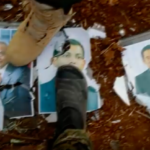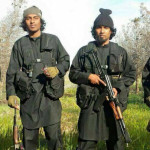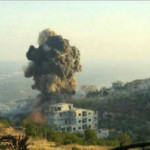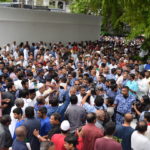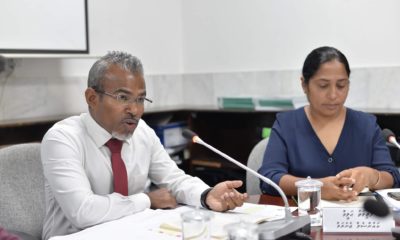A two-page letter urging Maldivians to wage jihad was distributed after the mass Eid prayer at the Maafanu stadium in Malé.
A group of men with their faces covered reportedly handed out the letter to prayer-goers on Monday morning. The letter states that its content was taken from the website of Bilad Al Sham, a media group operated by Maldivians fighting in Syria with the al-Nusra Front, now called Jabhat Fatah al-Sham.
“What we have to remember is that obedience to parents is a fard al-ayn [obligatory for all Muslims] while jihad is a fard al-kifaya [not obligatory for all but when fulfilled by some, exempts other Muslims],” reads the letter.
“Nevertheless, in some circumstances, jihad becomes a fard al-ayn.”
The police spokesman said the incident has not prompted an investigation.
“We have heard about this. However, we haven’t been able to locate this letter or leaflet from anywhere, including social media,” he said.
“Such a case has also not been filed so we don’t have anything other than people saying it was distributed.”
According to the letter, its content was produced in March 2014 by Abu Dhujana, the alias of a Maldivian killed in the Syrian civil war in September 2014.
The letter concluded with a prayer for God to bestow blessings upon the “brothers” who operate Bilad Al Sham and to “grant the fortune to further publish beneficial writings such as this”.
Bilad Al Sham has reported the death of at least six Maldivians fighting with the then-al-Qaeda-affiliated militant organisation.
In June, the group released a YouTube video described as “a small warning” to Maldivian leaders.
Later that month, Defence Minister Adam Shareef Umar told the Maldives Independent that some individuals suspected of recruiting Maldivians for militant extremist groups are under surveillance.
No arrests have been made so far.
Many Maldivians in Syria – including couples who travelled with children, immigrations officers, and members of Malé’s criminal gangs – maintain regular contact with their families through social media.
A controversial new anti-terror law enacted in late 2015 meanwhile criminalised travelling abroad with the intent of joining a terror group. The first charges were raised in May against three Maldivian men arrested from the Turkey-Syria border, who have since pleaded not guilty.
But the government has been accused of ignoring the threat posed by jihadi recruitment since the first reports of Maldivians joining militant groups emerged two years ago.
The opposition claims as many as 250 Maldivians are now fighting in Syria and Iraq – the highest figure per capita in the region.
The government says the opposition has been inflating the figure to lobby international support for its cause.
In early August, the parliament approved the first state policy on combating terrorism and violent extremism, which broadly outlined plans to take “a central and active role” internationally, strengthen national security, and conduct de-radicalisation and rehabilitation programmes.
Critics who questioned the effectiveness of the harsh penalties in the anti-terror law had called on the government to undertake awareness programs to address radicalisation and to establish early intervention and rehabilitation programmes.
The Islamic ministry and scholars at the Fiqh Academy have also urged young Maldivians to refrain from participating in foreign wars.


